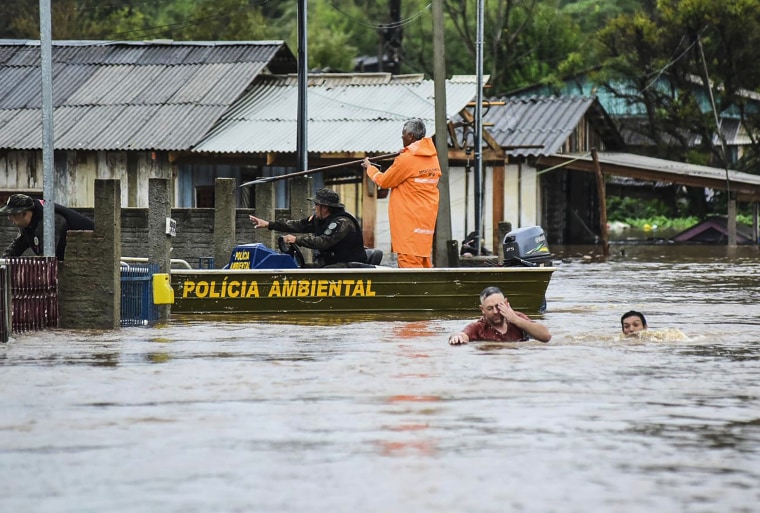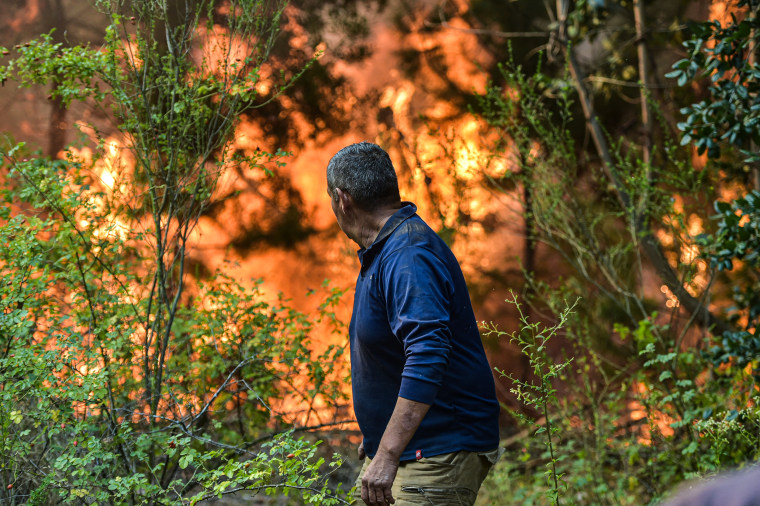Climate change misinformation in Latin America threatens efforts to combat it
The spread of false narratives around three recent extreme weather events in Latin America shows how climate change misinformation in Spanish and Portuguese can undermine efforts to address and mitigate the effects of global warming in the region, according to a new study released Wednesday.
Environmental organizations Roots and Friends of the Earth, which are part of the Climate Action Against Disinformation Coalition, commissioned progressive research firm Purpose to analyze how cyclone floods in Brazil and Peru as well as wildfires in Chile became fertile ground for misinformation to flourish online.
Online posts in Brazil, Peru and Chile falsely attributed the events to dam breakages, arson and climate research centers that study the atmosphere — sowing confusion, deflecting conversations about extreme weather preparedness, and politicizing climate action, the study concluded.
The new research points to “a troubling cycle,” Max MacBride, counter-disinformation lead at Roots, said in a statement.
A few conspiracy theory posts — and a massive reach online
A cyclone battered the state of Rio Grande do Sul in southern Brazil in September. The storm’s unusually heavy rains and wind gusts caused intense flooding and landslides that killed more than 30 people and severely damaged countless homes.
While news sources online reported on the flooding in the context of a climate catastrophe, disinformation spreaders were falsely claiming the floods were the result of three dams’ gates being opened.
The false narrative began circulating a couple of days after the storm as center-right local leadership in the region publicly inquired about the “opening of the gates” to the company operating the dams, as stated in a media release, according to the study. The company responded, saying there was no evidence suggesting the dams had influenced the flooding.

The Brazilian state’s environmental department then confirmed the floods were caused by the cyclone and had no connection to the dams, but the false narrative kept spreading online.
The study examined 66,800 posts, including posts on the social media site X and news portal comments, about the floods and cyclone. A small number of them (1,800 posts) were found to also discuss the dam gates. But this small portion reached a significantly larger audience of over 5.2 million people, suggesting how social media algorithms can boost misinformation.
“We won’t be able to protect people in Latin America from climate change if professional disinformers keep manipulating weather disasters by gaming social media algorithms,” Michael Khoo, the climate disinformation program director at Friends of the Earth, said in a statement.
X did not respond to a request for comment.
In Brazil, videos and discussions posted to TikTok and YouTube spread misinformation and conspiracy theories about open dam gates — instead of the cyclone — causing the floods. These garnered hundreds of thousands of views and were key to the spread of such misinformation on both platforms.
TikTok said it prohibits climate change misinformation that undermines well-established scientific consensus. The platform relies on moderators, experts and fact-checkers to monitor content, and users can also use TikTok’s misinformation reporting tool to report false content.
YouTube did not respond to a request for comment, but it previously shared with NBC News some of its efforts to combat climate misinformation in languages other than English. A spokesperson said in August that YouTube’s systems don’t generally “recommend or prominently surface content that includes climate change misinformation,” and instead feature videos from authoritative sources in search results and recommendations. It also employs “monetization policies prohibiting ads that contradict authoritative scientific consensus on the existence of and causes behind climate change.”
The study also cites a Brazilian local newspaper investigation that found the spread of misinformation on WhatsApp about the dam causing the floods. It appears that hundreds of thousands of people watched videos shared on the encrypted messaging app that included false claims politicizing the disaster, as the dam at the center of the misinformation was built by the left-wing party currently in power.
Meta, the parent company of Facebook and WhatsApp, did not respond to a request for comment.
Like Brazil, Peru was also ravaged by a cyclone in March. Cyclone Yaku killed more than 50 people and damaged more than 20,000 homes.
In the storm’s aftermath, social media posts emerged suggesting Cyclone Yaku was created by HAARP — a program that studies parts of the atmosphere and has long been the target of conspiracy theories and even flat Earth theories — and by the Jicamarca Observatory in Peru, a radar facility also used to study parts of the atmosphere.
Spanish-language climate misinformation related to HAARP is incredibly common globally, with study researchers identifying 10,655 posts across multiple social media platforms between Jan. 1 and Oct. 5. The posts had a combined reach of over 32.2 million people, according to the study.
But the presence of the Jicamarca Observatory in Peru served as a link to connect the broader HAARP conspiracy theory to Cyclone Yaku.
Such posts garnered hundreds of thousands of views across multiple social media platforms such as X, TikTok and Facebook, researchers found.
Making arson the ‘single cause’ of forest fires
In Chile, when parts of cities in the central and southern regions experienced more than 400 forest fires in February amid extreme heat and drought, a small number of posts on X solely blaming the wildfires on arsonists gained over a million views, according to the study.
Wildfires at the time were mainly caused by a combination of factors: a historic drought, a persistent heat wave and an increase in the amount of unattended agricultural land vulnerable to wildfires.
However, local authorities in Chile arrested at least 17 people who allegedly started some forest fires intentionally or negligently while doing activities such as welding and burning animal wool.
According to the study, these arrests were followed by Chilean political leaders, mainly right-wing and conservative ones, falsely claiming that arson was “the single cause of the devastating wildfires,” the report stated.

When researchers analyzed a random sample of 20,000 X posts and news portal comments, they found 184 posts that mentioned the words “arsonists” or “terrorists.” Those posts reached over 1.5 million people, in part due to high-profile individuals sharing them online, according to the study.
This helped steer the online conversation away from the impact of climate change and how it can exacerbate wildfires by suggesting that criminal acts were the cause of the worsening fires, the study found.
According to the report, online misinformation surrounding the three events blamed the destruction on a specific “scapegoat, eliciting anger from local audiences,” and perpetuated political divisions or existing false narratives — such as that HAARP changes the weather — and in turn deflected the conversation away from ongoing climate issues and ways to address them.
While some social media companies have implemented content moderation guidelines to curb climate change misinformation on their platforms, members of the Climate Action Against Disinformation Coalition say they need to “take much stronger action to stop the spread of misinformation online” in all languages, MacBride and Khoo said.

